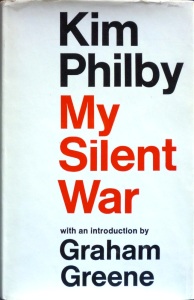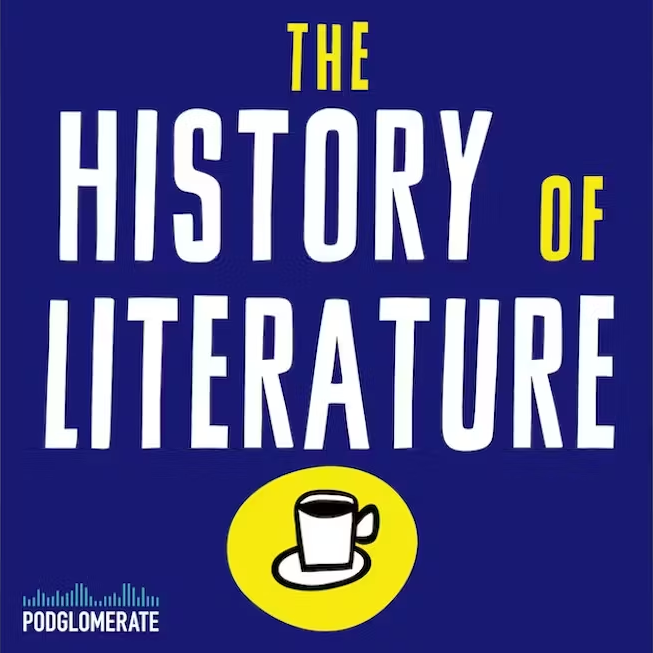It’s one of the great mysteries of Graham Greene’s life, and it may have cost him the Nobel Prize. I alluded to it in the podcast that Mike and I did on Greene’s life and works.
 Part of it isn’t a mystery at all, of course. We know that Greene worked for Britain’s foreign intelligence service, MI-6. (He was recruited there by his sister.) And we know that while he was there, he worked for Kim Philby, the real-life Third Man, the notorious double agent – probably the most notorious spy of the twentieth century. And we know that after Philby defected to Moscow, Greene supported him. He wrote an introduction to Philby’s memoirs in which he depicted Philby’s treason with sympathy, suggesting that his devotion to Communism was a higher morality than loyalty to his country.
Part of it isn’t a mystery at all, of course. We know that Greene worked for Britain’s foreign intelligence service, MI-6. (He was recruited there by his sister.) And we know that while he was there, he worked for Kim Philby, the real-life Third Man, the notorious double agent – probably the most notorious spy of the twentieth century. And we know that after Philby defected to Moscow, Greene supported him. He wrote an introduction to Philby’s memoirs in which he depicted Philby’s treason with sympathy, suggesting that his devotion to Communism was a higher morality than loyalty to his country.
Those are all facts. We know that those things happened.
But did Greene get it right? Did he have the information he needed to make a solid judgment? Or was Greene being played by Philby?
It seems nearly impossible to imagine now, but there were whispers at the time: Philby wasn’t just a double agent working for the Soviets…he was a triple agent, secretly posing as a traitor in order to penetrate the KGB in Moscow. And this grand theory wasn’t just concocted by a salacious press or some idle screenwriter with time on his hands…the KGB itself thought it might be true.
What would that mean for Greene? Ron Rosenbaum, writing one of his typical magnum opuses in 1994, speculated on the consequences:
Imagine Greene’s distress, then, at the possibility that Philby had been not a Soviet double agent but a British triple agent. Greene had gone out on a limb to portray Philby as a passionate pilgrim, a sincere devotee of the Marxist faith — radically innocent rather than radically evil. But if, in fact, his friend had all along been an agent of the Empire, a hireling of Colonel Blimp, it would mean that Philby had been laughing at Greene. Not merely laughing at him, but using him, using him as cover. Graham Greene would turn out to be Kim Philby’s final fool.
“As a matter of urgency,” Cave Brown told me, “Greene summoned up enough energy to send for his papers, for all his literature relating to Kim and certain letters from him.”
Fascinating. Why would Greene want to read those letters? Certain letters? That definitely sounds like a man wanting to know the truth, wondering if he’d been deceived, hoping to find the answer. Rosenbaum again:
Cave Brown believes that Greene spent those last hours playing detective, sifting the literature and his memories of Philby for clues to the hidden truth about the role the ultimate secret agent played in the secret history of our century. And that Greene was preparing to respond to Sherry’s query with his last word on the Philby case. It would have been Greene’s summa, his ultimate espionage thriller. With little time left to live, Graham Greene was in a race against the clock.
Rosenbaum thinks he finds the answer through some marginalia in some manuscripts. As is so often the case with Ron Rosenbaum pieces, he promises a lot that he doesn’t deliver, and he takes thousands and thousands (and thousands and thousands) of words to get there. So I’m not going to send you to the piece and tell you to read the whole thing. I’m going to violate that particular rule of Internet etiquette this time.
Instead, I’ll jump to the end. Rosenbaum’s not sure if Greene ever satisfied himself that his assessment of Philby had been correct, or if he went to his grave wondering if he had been duped. Rosenbaum simply doesn’t know. But he posits an interesting theory, one consistent with Greene’s status as the great chronicler of the human side of espionage.
Perhaps the single most telling instance of Philby’s last great disinformation operation can be found in correspondence between him and Graham Greene over Greene’s novel “The Human Factor.” It was a book Greene wrote in the 60’s but didn’t publish until the late 70’s because it came so close to the Philby affair.
Many found resemblances to Philby and his predicament in Greene’s protagonist, a mid-level mole named Castle. Apparently, Philby did too. Greene had sent him a copy of the manuscript before publication, and Philby had made particular objection to one passage, at the very close of the book, when Castle, like Philby, has escaped to Moscow and is trying to adjust to his ambiguous position there.
The passage Philby objected to depicts Castle in a tiny, depressing apartment, amid stained, secondhand furniture, insisting over his malfunctioning telephone to his wife in London, that he’s quite content: “Oh, everyone is very kind. They have given me a sort of job. They are grateful to me. . . . ”
Philby wrote to Greene urging him to change this impression. It was misleading, melancholy. And, by implication, not at all like his circumstances in Moscow. Greene wrote back thanking Philby for the helpful suggestion, but he would not change the bleak mood.
Greene must have had the novelist’s sixth sense from this exchange that the melancholy portrait of the lonely mole in his Moscow apartment, vainly boasting how “grateful” everyone was, had struck home with Philby. That there was a truth to it Philby recognized, a truth about himself that all the tacky ribbons and trophies he gathered from his “grateful” fraternal K.G.B. comrades could not obscure.
Shortly after Graham Greene’s funeral, his biographer, Norman Sherry, visited the room where Greene had died. On a table next to the empty bed, he found the letter he’d written to Greene, the one asking for his final thoughts on Philby. Members of Greene’s family said that they had found no reply.
If Greene took a Philby secret to his grave, it might have had nothing to do with whether Kim was a double or triple agent. It might have had everything to do with the lonely man in the Moscow apartment.
Perhaps Greene saw through Philby’s last great lie, but — unlike Kim — he wouldn’t blow a friend’s cover.
Unlike Kim…and unlike Holly Martens, perhaps.
I’m referring, of course, to the great Joseph Cotten character in the film The Third Man. The one who faces a similar dilemma. A friend’s duplicity is exposed. Where do our loyalties lie? What action do we take?
Anyone who’s seen The Third Man knows how hard Greene thought about this. On the great ladder of morality, what rung does friendship occupy? Where does this good, decent quality – personal loyalty – blur into something negative…even something corrupt or evil?
Somewhere Harry Lime is back in the shadows, grinning at his friend’s discovery…and the richness of his dilemma.
Listen to our conversation about Graham Greene’s life and works or check out the other installments in the History of Literature podcast.
HoL Episode 39 Graham Greene: Play in new window | Download (Duration: 51:36 — 35.7MB)
Subscribe: iTunes | Android | RSS | More Subscribe Options

Leave a comment